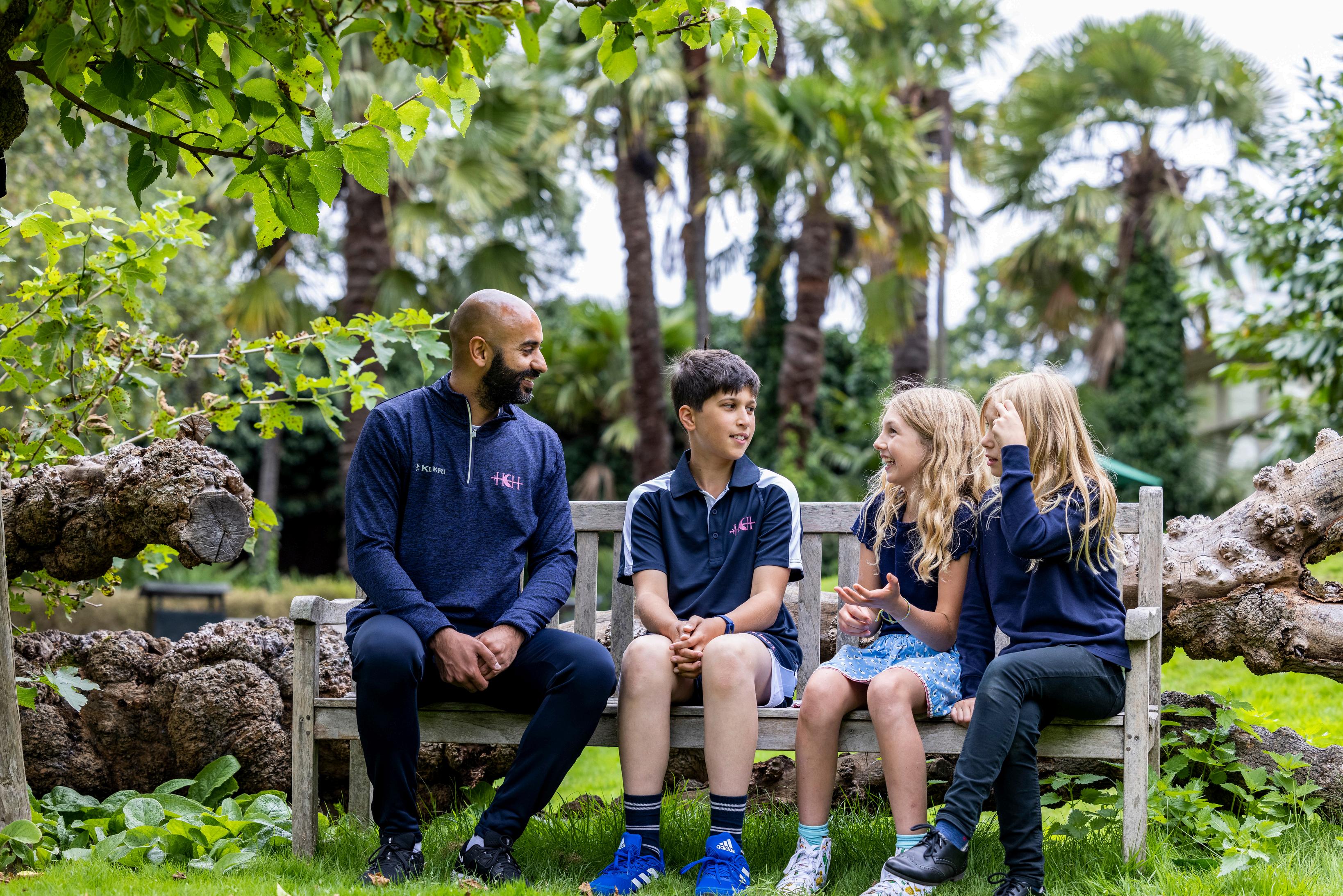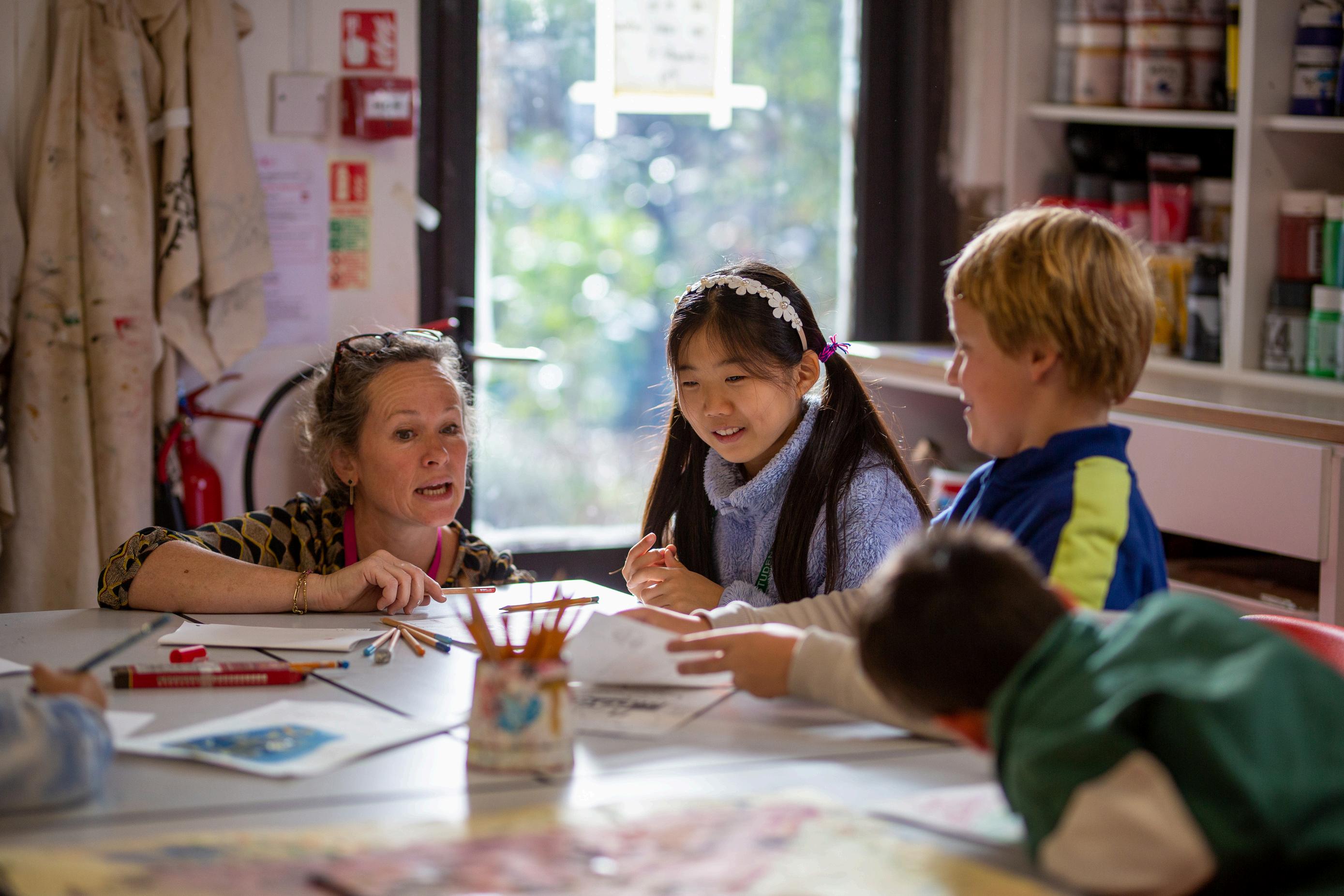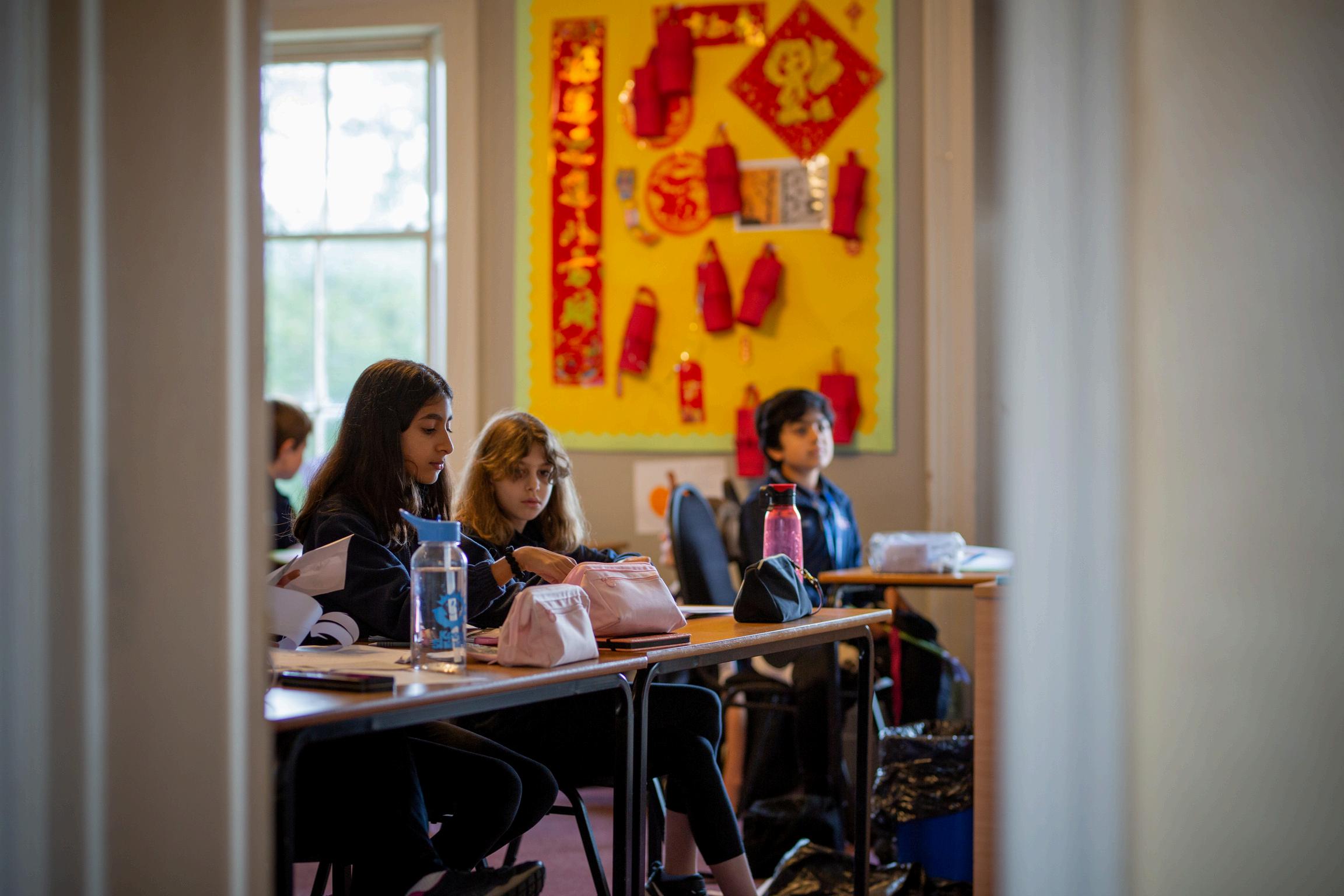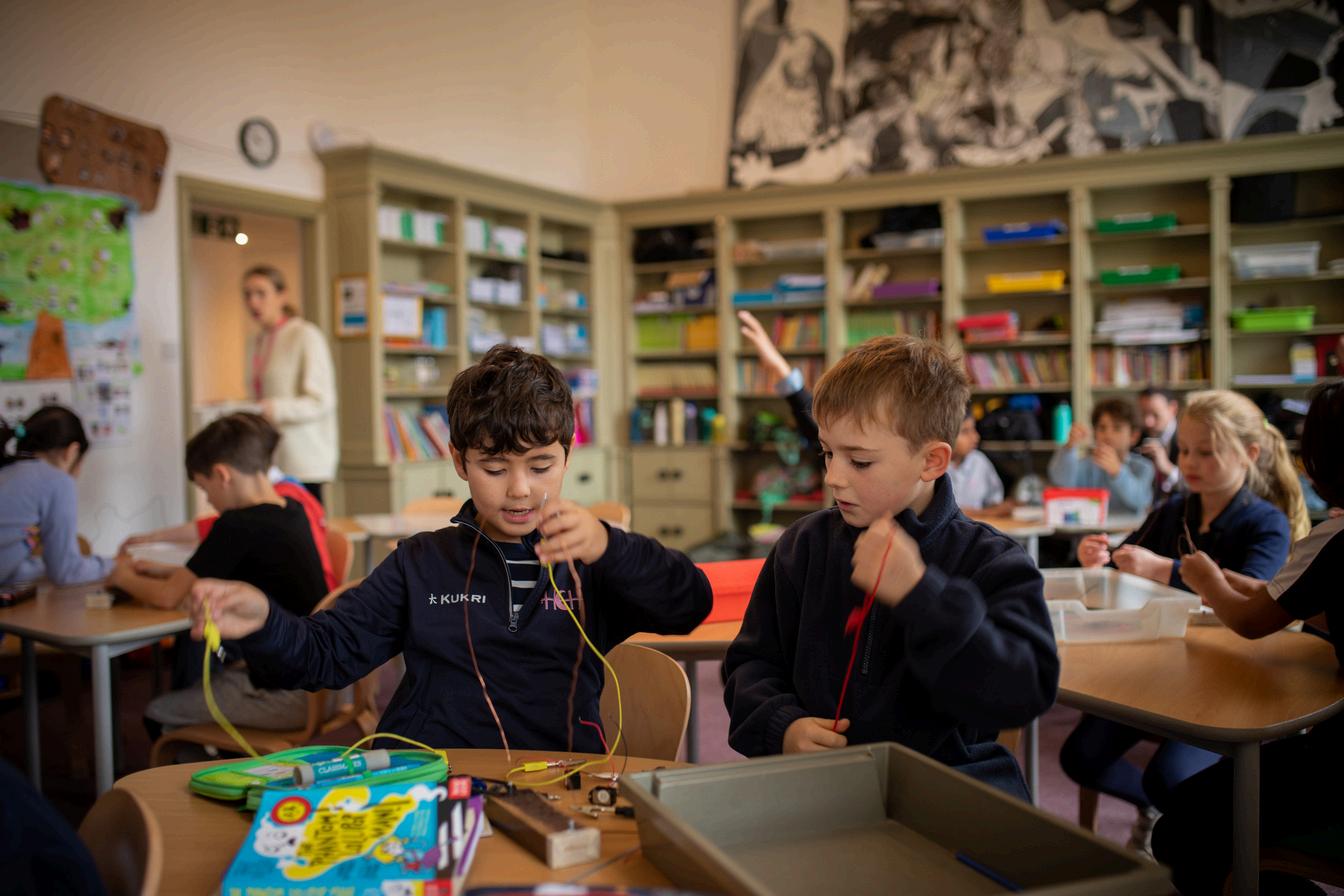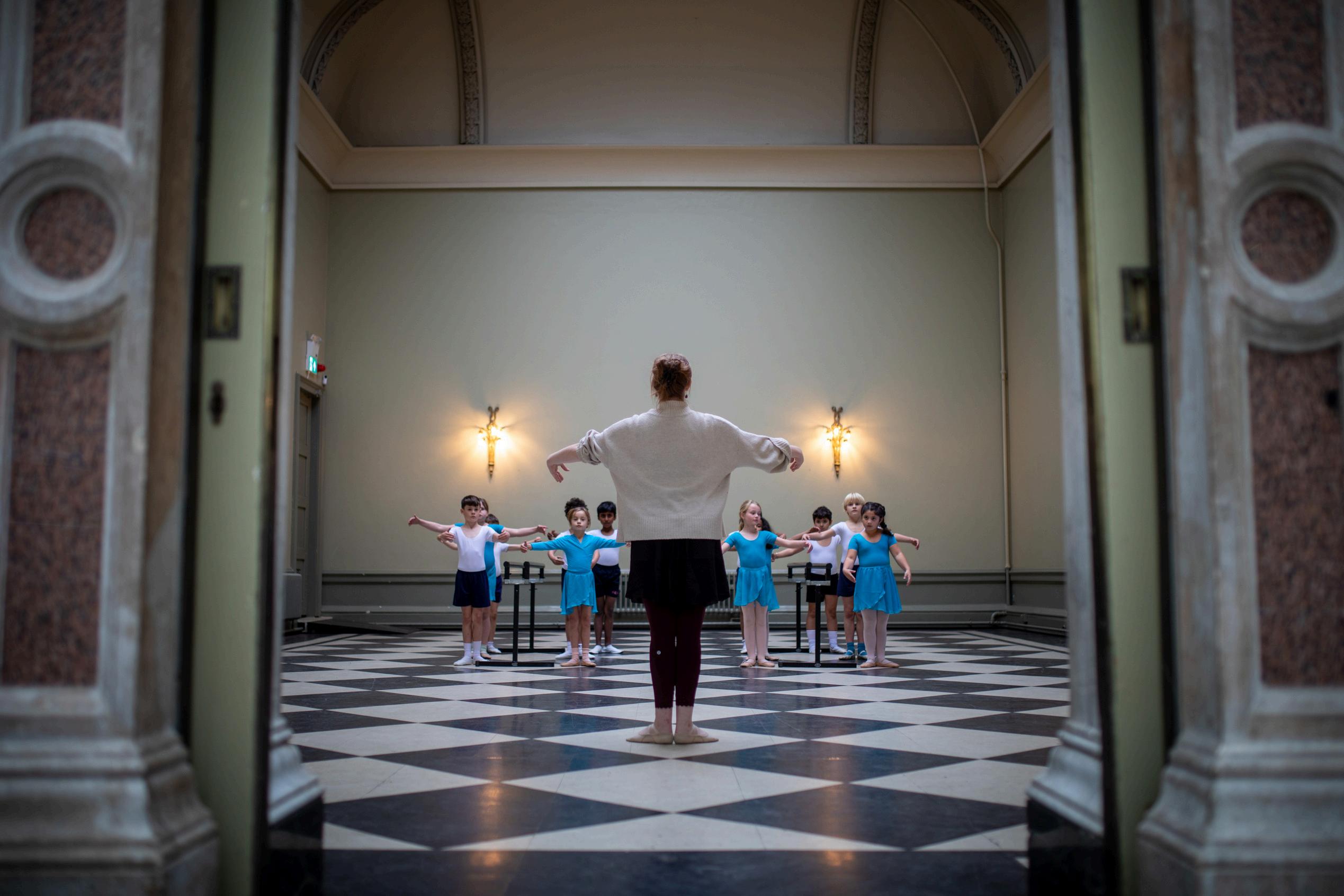Teaching and Curriculum at Hampton Court House
Key contacts
Learning about the life and influences of Joseph Cornell, his collection of ephemera and his methods of assembling items to tell a personal story. Students will use modelling techniques and learn about composition when creating their own assemblage piece using items which they have collected over the summer holiday.
Students will then look at the work of Olivia Lomench Gill and Max Ernst to inform studies of fantastic and mythical beasts, using different techniques to create pattern and texture in their work. After making different studies, pupils will create their own mythical creature out of clay to be fired in the kiln.
Term
Autumn 1
Autumn 2
Spring 1
Spring 2
Summer 1
Summer 2
What are we studying?
Joseph Cornell: Learning about the life and influences of Joseph Cornell, how he collected ephemera to make art, learning about nostalgia, memories, creating a sense of place. Students will collect items over the summer break and create a work to tell a personal story.
Clay: Pupils will look at the work of Olivia Lomench Gill and Max Ernst. Learning how to prepare different backgrounds on which to draw and drawing in different mediums, pupils will create a series of fantastic beasts. Pupils will learn techniques in hand building to create their own creatures out of clay which will be fired in the kiln.
Japan: Pupils will study the traditions and art of Japan, learn the origins of origami and study the tradition of woodblock printing by looking at the prints of Hokusai.
Japan: Making Koinobori streamers for Children’s Day on 5th May. Pupils will learn about tessellating pattern, specifically fish scale patterns and practise painting on fabric to create their design. Pupils will learn to use a sewing machine to create their Koinobori streamer.
Recycled art: Learning about artists Vik Muniz and his recycled art, students will create a version of Vincent Van Gogh’s Sunflowers out of torn magazine pages. Pupils will learn about the work of Tim Noble and Sue Webster, and make their own shadow art.
Recycled art continued: Looking at the photography of Stephen Gladieu and studying his project about the plastic waste which ends up in the Democratic Republic of Congo. Students will use recyclable materials to create their own outfits which we will then photograph.
Term
Autumn 1
What are we studying?
Chris Riddell Goth Girl
Through Chris Riddell’s Goth Girl, explore how atmosphere, settings & characters are created. Study adverbs of possibility, commas, relative clauses, dialogue punctuation.
Migration by Mike Unwin and Jenni Desmond
Three amazing texts stimulate children’s reading, writing and discussion of first animal, then human, migration. Writing cohesively and using parentheses form the SPaG element, but children’s own creative work will make this block truly exciting.
Lewis Carrol and Hilaire Belloc poetry.
Lewis Carroll's Walrus and the Carpenter and Hilaire Belloc's Cautionary Tales stimulate performance, debate, persuasive writing and poetry writing. Revise adverbs and modal verbs.
Year 5 Decibel 2
Term
Autumn 1
Autumn 2
Spring 1
Spring 2
Summer 1
Summer 2
What are we studying?
In unit 0 and 1, the students will introduce themselves and talk about going back to school after the holidays They will talk about their activities and describe themselves physically We will talk about countries and nationalities
In unit 2, we will talk about directions We will learn to make suggestions and invitations We will talk about future projects
In unit 3, students will talk about their Christmas holidays and presents We will then learn to purchase in a shop, express possession and learn to understand a recipe
In unit 4, we will talk about our house and our bedroom We will introduce the past tense and tell past events
In Unit 5 we will go to the restaurant! We will talk about food and food habits, likes and dislikes Students will learn to order in a restaurant
In unit 6, we will talk discuss the weather, weather forecast and seasons We will also find out about future plans It will also be time to revise what we have studied so far!
FLAM
The pupils will embark on an exciting language learning adventure as they delve into a collection of engaging activities. They will immerse themselves in captivating stories such as "Fifi Brindacier", “Harry Potter à l’école des sorciers” and "La Chèvre de M. Seguin", developing their comprehension skills and interpreting key information. They will learn to construct sentences using invariant words and identify verbs and their tenses. Exploring the world of comics, including "L'encrier" and "Moi, le loup et les chocos", the pupils will sharpen their visual literacy and storytelling abilities.
Additionally, they will tackle scientific documents, enhancing their reading skills and understanding technical information. They will practise extracting meaning and expand their vocabulary. With their newfound knowledge, the pupils will unleash their creativity by writing story continuations, embracing the infinitive form, and enhancing their expression. They will deepen their understanding of language by exploring dictionary definitions and developing strong comprehension abilities.
Students will be assessed at the start of the year and at the end of each module. They will also have regular spelling and conjugation tests throughout the term. In addition, students will be expected to write two book reviews during the term.
Term
Autumn
Spring
Summer
What are we studying?
MODULE 1
Compréhension écrite : extraits de roman et BD, calendrier
Grammaire du verbe : passé-présent-futur, les groupes
Lexique : l’ordre alphabétique, expression du temps
Orthographe : la cédille, a/à, ou/où, les mots invariables
Analyse grammaticale : phrase verbale/nominale, phrase simple/complexe
Ecriture : invention (connecteurs de temps, cohérence et mise en page des paragraphes)
MODULE 2
Compréhension écrite : la lettre
Analyse grammaticale (suite)
Grammaire du verbe (suite)
Ecriture : mettre en forme une lettre et compléter une enveloppe
Lexique : les mots particuliers et génériques
Orthographe : les homophones grammaticaux (son/sont, et/est/es), la lettre ‘g’ et les mots invariables.
Récitation : L’Ile des rêves
MODULE 3
Compréhension écrite : Interpréter un texte à l’aide d’indices implicites ou explicites – Les faits divers
Ecriture : inventer un fait divers
Lexique : les synonymes et les différents sens d’un même mot
Analyse grammaticale (suite)
Conjugaison : révisions du présent et des verbes irréguliers.
Orthographe : mots irréguliers et mots de la même famille.
Mémoriser et interpréter un poème de son choix parmi ceux étudiés.
Harmony, continued
Cycles
Spring 1
Spring 2
Summer 1
Summer 2
What are we studying?
Inquiry Question: How do living things change as they grow?
Pupils will learn about life cycles and develop knowledge about the changes living things (animals including humans and plants) go through as they develop with age They will learn about how living things evolved and identify changes in matter and materials Learning about life cycles, the processes of growth and development, and the principles of evolution, students will gain a comprehensive understanding of how living things change over time These lessons will help them appreciate the complexity and diversity of life on Earth
Interdependence
Inquiry Question: What makes ‘me’ become ‘we’?
Pupils will learn about the importance of mental well-being and how humans are naturally social creatures They will learn about the importance of communities and that these are not exclusive to humans Communities are a population of species that interact with each other, and they are natural, biologically diverse ecosystems Keeping these healthy and in balance are important factors to our mental well-being
Oneness
Inquiry Question: Why is biodiversity important in the environment?
Students will explore and develop an understanding of how biodiversity is important in the environment because it contributes to ecosystem stability and resilience, provides essential ecosystem services, offers genetic resources for innovation and adaptation, has cultural and recreational value, supports economic activities, and enhances resilience to climate change Protecting and conserving biodiversity is essential for maintaining healthy ecosystems and ensuring the well-being of present and future generations of all living things
Diversity
Inquiry Question: How do we live different lives on a common ground?
Students will study the diverse ways in which living things coexist and interact within shared environments on the Planet and explore ways in which we can navigate living different lives on common ground
They will learn about how soil serves as a vital carbon storehouse, playing a crucial role in carbon sequestration, soil health, biodiversity, and ecosystem function Protecting soil is essential for mitigating climate change, promoting food security, and preserving natural ecosystems
t e n t Year 5 will begin an introduction to Latin with Minimus Book 1 The autumn term will be looking to familiarise them with the links between Latin and English grammar and vocabulary by exploring life with the family of Vindolandan General Flavius and his family through the eyes of their ever-present household guest and resident mouse, Minimus
During the Autumn term, Year 5 students will begin their Mandarin Chinese journey by learning basic pronunciation rules and the fundamental strokes used to write Chinese characters. They will start with core topics such as numbers, greetings, and simple self-introductions, while also gaining an introductory understanding of Chinese geography and culture.
To enhance cultural appreciation and engagement, students will explore the legend of the Mid-Autumn Festival and take part in hands-on activities such as making traditional Chinese lanterns. They will also learn popular Chinese children’s songs, helping to reinforce vocabulary and pronunciation through music and rhythm in an enjoyable, interactive way.
Maths
In the first half term, pupils will learn about: investigating number patterns
reading and writing roman numerals
writing and ordering numbers less than 10 million
rounding to the nearest 10, 100, and 1000
formal methods of addition and subtraction and applying those methods to word problems
Formal methods of multiplication and division
How it will be assessed
In the second half term, pupils will learn about:
Factors, multiples, and prime numbers
Measuring, drawing, and calculating angles
Simplifying and ordering fractions
Adding, subtracting, multiplying, and dividing fractions
Termly online assessments are completed by the pupils to demonstrate their depth of understanding of the mathematical topics that they have been studying In addition, informal oral assessment takes place in lessons throughout the term to consolidate and assess depth of understanding
Autumn 1
Spring 1
Summer 1
Roman numerals
Place value
Methods for adding, subtracting, multiplying, and dividing
2-D shapes
Negative numbers and coordinates
Translation and reflection
Decimals introduction
Fractions of quantities
Percentages
Long multiplication
Division methods
Autumn 2
Spring 2
Summer 2
Factors, multiples, and primes
Angles
Fractions
Decimals calculations
Comparing decimals, fractions, and percentages
Money and measure
Area and Perimeter
3-D shapes
Tables and graphs
Time and timetables
The Year 5 Science Curriculum will cover Laboratory Safety, Properties of Materials, Changes of Materials, Earth and Space, Forces, Living Things and their Habitats and Animals including Humans.
In this capacity the pupils will be taught the following skills:
To plan different types of experiments.
Identify equipment required for experiment
Take measurements, using scientific equipment; e g measuring cylinder and scales
Record data and results in tables and bar and line graphs, using a ruler and a pencil
Make predictions, using test results
Present findings, through graphs, tables evaluations and conclusions
How it will be assessed
Pupils will be assessed on ½ termly tests to determine understanding and misconceptions
Then in the Summer Term the pupils will be assessed on the years ’ work to evaluate knowledge and understanding
Organised physical activity is essential for child development, contributing to physical strength, growth, cognitive skills, motivation, and social abilities The Year 5 children will focus on the core skills of two invasion games: football and netball.
In football, students will enhance their understanding of key skills needed to play the game. This will involve learning different ways to pass the ball, various techniques for shooting the ball into the goal, and effective dribbling around the pitch Additionally, they will work on their agility during games
Through individual practice, partner activities, and group tasks, the children will deepen their understanding of the sport by participating in small-sided conditioned games.
In netball, students will expand their knowledge of catching, throwing, and movement as they play. They will be taught the basic positions on the court, how to shoot, and the different types of passes applicable in game situations.
Term
Autumn
Spring 1
Spring 2
Summer 1
Summer 2
What are we studying?
Football: passing, shooting, dribbling, conditioned games
Netball: passing, shooting, attack vs defence, positions and conditioned games
Games: balance, coordination, agility, stuck in the mud, octopus tag, capture the flag
Gymnastics: balances, body shapes, travel, jumps and rolls
Hockey: passing, shooting, dribbling, conditioned games
Benchball: throwing, catching, positions and attack vs defence
Gymnastics: balances, body shapes, travel, jumps and rolls
Hockey: passing, shooting, dribbling, conditioned games
Dodgeball: passing, dodging, tactics and attack vs defence
Cricket: throwing, catching, batting, bowling and fielding
Athletics: shuttle relay, 60m sprint, 200m sprint, hurdles, long jump, javelin throw and shot-put throw
Cricket: throwing, catching, batting, bowling and fielding
Athletics: shuttle relay, 60m sprint, 200m sprint, hurdles, long jump, javelin throw and shot-put throw




